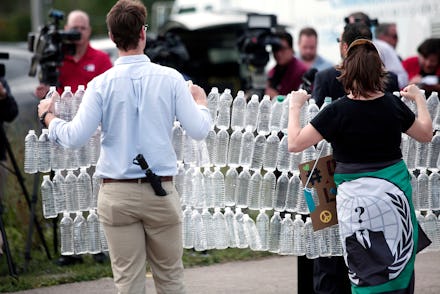Flint's shigellosis outbreak tells us one thing: The water problem is worse than ever

It hasn't even been a year since President Barack Obama declared a state of emergency in Flint, Michigan, after authorities detected high concentrations of lead in the city's water supply. But residents are already dealing with another health crisis.
This time, it's an outbreak of shigellosis, a highly contagious, dysentery-like bacterial disease that can cause fever and bloody diarrhea. There are already 84 cases in Genesee County, and 53 within Flint city limits. At least 27 of those cases involved hospitalizations, CNN reported.
And it's not simply bad luck — the outbreak has a very real link to the manmade water contamination crisis that made headlines earlier this year. Shigella is easy to transmit without proper hygiene, and it's hard to have proper hygiene when you don't have clean water — something Flint hasn't had for years.
When a national news story loses its above-the-fold status, it's easy to assume things worked themselves out. But Flint's problem didn't leave town when the national spotlight did. In fact, Flint's water is still unsafe to drink.
And promises of a full recovery continue to elude the city of 98,000. Estimates for repaired and updated water pipes are in the millions. In the meantime, many residents continue to wait in vain as the presence of groups like the National Guard and Red Cross dwindles.
"We aren't passing out water anymore or any of that stuff we did initially," Captain Corissa Barton, deputy public affairs officer for the Michigan National Guard's Department of Military and Veterans Affairs, said in a phone interview Thursday. "We have three individuals in Flint but I believe they're there as advisors, if anything comes up."
In the city's 5th ward, one of the areas hit hardest by the crisis, clean drinking water has become increasingly.
"All fire stations [stopped] passing out free drinking water," resident Artina Buggs said in a text message Wednesday. "It's churches and wards passing out water, but one ward stopped already."
Ron Leix, public information officer for the Michigan State Police Emergency Management and Homeland Security Division, said that ward water sites are subject to temporary closures due to weather, safety concerns or property obligations like previously scheduled events. But so far there haven't been any permanent shutdowns.
When the crisis broke out, the city converted its fire stations into National Guard-supported water distribution sites. In May, however, that system was deemed unsustainable and shut down. "It was taxing on the fire department to have those services," Rico Philips, Flint Fire Department's quartermaster, said in a phone interview Thursday.
In the months that followed, community water resource sites opened throughout the city. Now the distribution sites live on a mishmash of available square footage: churches, a bowling alley, a couple event spaces and a retired farmers' market, all watched over by community members as part of a work experience program.
"Since January we've transitioned from the five fire stations with National Guard members distributing water supplies," Leix said. "Now we have nine community water sites staffed by Flint residents. ... There's more locations, [but] we've seen a subtle [downtick] in distribution of bottled water."
As all this was going on, fearful residents went to great lengths to avoid contact with the contaminated water. Jim Henry, Genesee County's environmental health supervisor, told CNN that many swore off tap water all together, bathing less and using baby wipes to stay clean.
"But baby wipes are not effective, they're not chlorinated, it doesn't kill the bacteria and it doesn't replace hand washing," Henry said. "People have changed their behavior regarding personal hygiene. They're scared."
Shigellosis in the U.S. isn't unheard of: In 2014 and 2015, the Centers for Disease Control and Prevention reported that shigella infected 243 people in 32 states and Puerto Rico. But those cases were introduced by ill travelers who came back to the states and infected others. The fact that Flint's shigella outbreak was born domestically speaks volumes about the city's condition.
Shigella in general is constantly present is communities around the country at low levels, according to Craig Hedberg, a professor of environmental health sciences at the University of Minnesota's School of Public Health. But, as he pointed out in an interview Thursday, "80 cases would be raised flags."
"If people are avoiding using water because it's affecting skin, so there's less hand washing and use of water to clean surfaces, that could enhance potential for transmission," Hedberg said.
Hedberg stressed the importance of washing hands and bathing, calling baby wipes and hand sanitizer "poor substitutes" for using actual water to rinse bacteria away. And so he arrived at the central problem: The best way to prevent a shigella outbreak is proper hygiene and sanitary water. But it doesn't matter if you ask residents, government officials or the National Guard: No one knows when Flint will have clean water again.
"I haven't taken a bath here in Flint since the lead issue and my skin still [itches]," Buggs said. "It's terrible, still 'til this day."